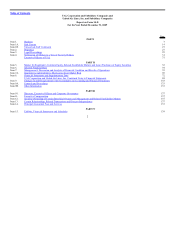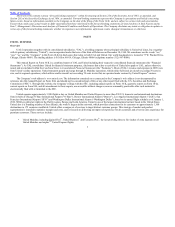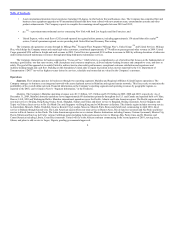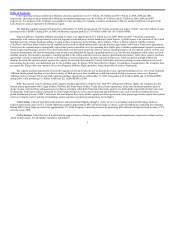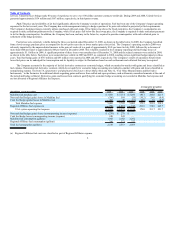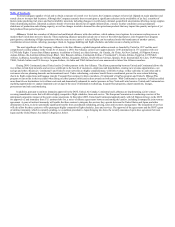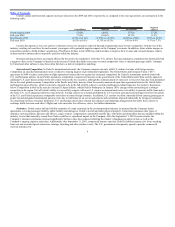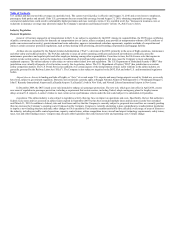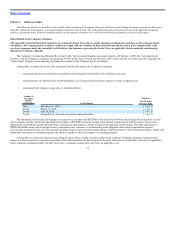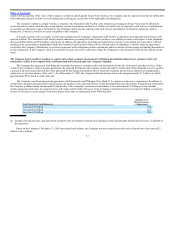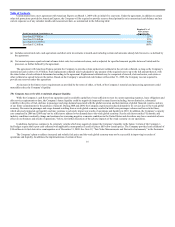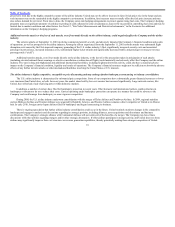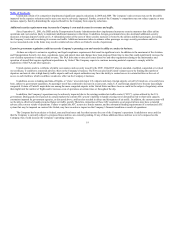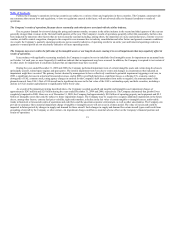United Airlines 2009 Annual Report Download - page 15
Download and view the complete annual report
Please find page 15 of the 2009 United Airlines annual report below. You can navigate through the pages in the report by either clicking on the pages listed below, or by using the keyword search tool below to find specific information within the annual report.
Table of Contents
legislation, which would regulate greenhouse gas emissions, is also likely to be a significant area of legislative and regulatory focus and could adversely impact
fuel costs. See Environmental Regulation, below.
Customer service issues have remained active areas for both Congress and DOT regulators during 2009. In addition to DOT customer service regulations
discussed above, additional regulations or legislation imposing more specific customer service requirements are likely to be approved in 2010, though what those
requirements might be is unclear at this time. The DOT has also proceeded with other regulatory changes in this area, including proposals regarding treatment of
and payments to passengers involuntarily denied boarding, domestic baggage liability and airline scheduling practices. Additionally, since September 11, 2001,
aviation security has been and continues to be a subject of frequent legislative and regulatory action, requiring changes to the Company’s security processes and
frequently increasing the cost of its security procedures.
International Regulation.
General. International air transportation is subject to extensive government regulation. In connection with United’s international services, the Company is
regulated by both the U.S. government and the governments of the foreign countries United serves. In addition, the availability of international routes to U.S.
carriers is regulated by aviation agreements between the U.S. and foreign governments, and in some cases, fares and schedules require the approval of the DOT
and/or the relevant foreign governments.
Airport Access. Historically, access to foreign markets has been tightly controlled through bilateral agreements between the U.S. and each foreign country
involved. These agreements regulate the markets served, the number of carriers allowed to serve each market and the frequency of carriers’ flights. Since the
early 1990s, the U.S. has pursued a policy of “open skies” (meaning all carriers have access to the destination), under which the U.S. government has negotiated
a number of bilateral agreements allowing unrestricted access between U.S. and foreign markets. Currently, there are more than 90 open skies agreements in
effect. Additionally, all of the airports that United serves in Europe and Asia maintain slot controls, and many of these are restrictive due to congestion at these
airports. London Heathrow, Frankfurt and Tokyo Narita are among the most restrictive airports due to capacity limitations. United has significant operations at
these locations.
United’s ability to serve some foreign markets and expand into certain others is limited by the absence altogether of aviation agreements between the U.S.
government and the relevant governments. Shifts in U.S. or foreign government aviation policies may lead to the alteration or termination of air service
agreements. Depending on the nature of any such change, the value of United’s international route authorities and slot rights may be materially enhanced or
diminished.
The U.S./EU open skies agreement became effective in 2008. This agreement replaced the bilateral arrangements between the U.S. government and the 27
EU member states. Based on the U.S. open skies model, it provides U.S. and EU carriers with expansive rights that have increased competition in transatlantic
markets. For example, U.S. and EU carriers now have the right to operate between any point in the United States and the EU. The agreement has no direct impact
on airport slot rights nor does it provide for a reallocation of existing slots, including those at London Heathrow. London Heathrow currently remains subject to
both slot and facility constraints. The agreement provides United with additional commercial opportunities since it triggered the effectiveness of the DOT’s grant
of anti-trust immunity to United and British carrier bmi, creating increased cooperation between the two carriers in the transatlantic market. Because of the
diverse nature of potential impacts on United’s business, however, the overall future impact of the U.S./EU agreement on United’s business cannot be predicted
with certainty.
Also in 2008, the EU adopted interpretive guidance and legislation that impacts the Company. The Commission officially sanctioned secondary slot
trading, a current practice among carriers that involves the sale, purchase or lease of slots. This action resolves disputes about the legality of slot exchanges at EU
airports including London Heathrow.
11



